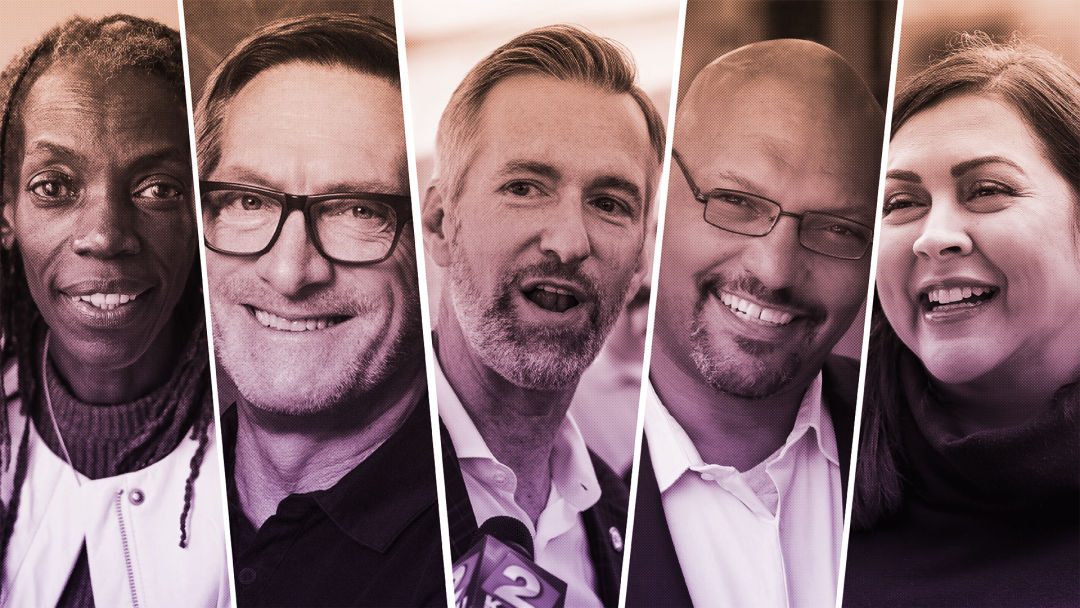What Will 2021 Have in Store for the Portland City Council?

Image: Brian Breneman
New year, new start?
The five members of the Portland city council would love that, after one of the most wrenching, divisive years in the city’s history.
When the holidays are over, two new council members, the Latino Network’s Carmen Rubio, and community organizer/college professor Mingus Mapps, will join Mayor Ted Wheeler and Commissioners Jo Ann Hardesty and Dan Ryan at City Hall, tilting the group in a more moderate direction.
But the headlines of 2020—which have their roots in a city that’s struggled for years to get a grip on rising houselessness and embedded racism—will be very much present in 2021. Here’s a look at four stories to watch out for in the new year.
1. Is 2021 the year Portland finally gets a new form of city government?
Portland is full of people who disagree on just about every point, but here’s one almost everyone can get behind: the current city hall structure is not really working out so well. Under our current system, the mayor and all four commissioners are elected citywide, instead of representing particular areas of the city. Each commissioner, moreover, has oversight over day-to-day management over a portfolio of bureaus, a system that’s been in place since 1913. That makes the city an anomaly among American cities, the vast majority of which have either a professional city manager or a “strong mayor”—but Portlanders voted down a strong mayor-council in 2007. There are signs, though, that 2021 could be a year for change. The Portland City Club has been focused on this issue for years and has been pushing for a revamp, which could include anything from expanding the number of seats on the council and electing representatives by district to adding ranked-choice voting to the hiring of a city manager. Importantly, members of the current council say they are open to the proposed changes.
2. Speaking of bureaus, what’s next for police reform?
Commissioner Jo Ann Hardesty spent months arguing that the Portland Police Bureau be added to her portfolio in 2020, but after a public break with Mayor Ted Wheeler over a plan this fall to trim an additional $18 million from the police budget, that’s in serious question. Wheeler could well choose to hang onto the police bureau, but whoever is in charge will have to contend with a host of issues, including a spike in gun violence that dates to pre-COVID times and the slower-than-expected rollout of the Portland Street Response team, which would send a trained social services worker instead of an armed police team to respond to mental health crisis calls. Overlaying it all: Portland voted for a new police oversight board charged with overseeing police disciplinary matters, which has some actual muscle behind it, including the ability to enforce discipline and compel testimony from officers, a first for the city.
3. What will the next iteration of downtown look like?
Portland isn’t alone in coping with this one, which is a question mark for cities all over the country. We don’t really know yet how long it will take until the office workers who power downtown’s lunch spots and stores will return to work, or even if they will now that employers have seen that remote work is possible (and cheaper than paying downtown rents). In some cities, quiet conversations have begun about converting empty office space to housing; in Portland, business owners recently announced plans to form a new group aimed at cleaning up graffiti downtown and lobbying for more government support.
4. Will 2021 be the year that affordable housing finally breaks through?
With all that has happened in Portland over the past year, polls show that houselessness is still the number one concern of most residents. And there’s a direct line between the growth in the numbers of people sleeping on city streets and some of the other issues above, including police responses to mental health issues and the fate of downtown. The city has been steadily ramping up efforts to provide shelter beds and transitional housing since the start of the pandemic; just this month, the city and Multnomah County partnered together to add two more shelter properties, while 19 more tiny homes opened in St. Johns. More systemic change is up for debate in 2021: By spring, city council is expected to vote on new rules that would speed up development of shelters and low-income housing. If passed, that will allow for more co-housing, more tiny pods, and more churches to provide shelters.




